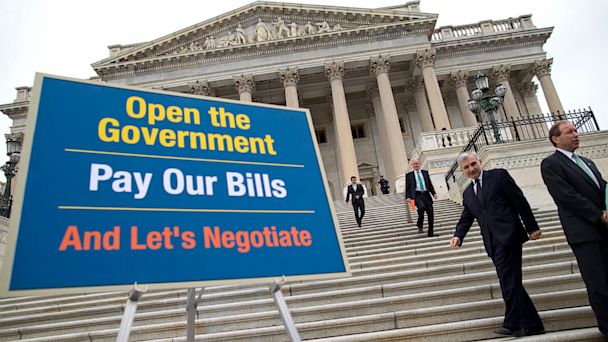Inside the GOP's Take-No-Prisoners Strategy Behind the Shutdown

(Evan Vucci/AP Photo)
Republicans in Congress may be looking for other ways to extract concessions from Democrats to restore funding to the government, but one of the most influential conservative groups has made it clear that anything less than defunding President Obama's health care law is unacceptable.
"The only acceptable way out of this is some sort of deal that funds the federal government without funding Obamacare," said Michael Needham, CEO of Heritage Action, at a breakfast sponsored by The Christian Science Monitor.
Needham said that no Keystone pipeline deal, individual mandate delay or tax reform compromise would satisfy the party's base.
Repeal the medical device tax in exchange for funding the government? A "laughable suggestion," Needham said.
Heritage Action, an arm of the Heritage Foundation, has been one of the principal Republican think tanks helping to amplify the grassroots Tea Party message that demanded a fight over the Affordable Care Act during Congress' August recess.
In its view, and there is some evidence to confirm it, mainstream D.C. Republicans were dragged kicking and screaming into the fight over the health care law. From Sen. John McCain, R-Ariz., to Sen. John Cornyn, R-Texas, Washington Republicans voiced their views, at least initially, that such a strategy was ill-conceived.
Now that they are in the fight, however, conservative advocates have no intention of abandoning their demands, or allowing government funding to be rolled into broader negotiations over the debt limit.
"The attention of Republicans and conservatives needs to go back on Obamacare, not on other ways out of this situation," Needham warned.
He also praised House Speaker John Boehner's strategy of holding votes on funding the government one piece at a time.
"I think we will win the debate over the government shutdown," Needham said. "If we want to sit in a government shutdown over the next several weeks over the [National Labor Relations Board] and the [Environmental Protection Agency] being shut down, I'm perfectly happy to sit in that situation until President Obama stops this unaffordable and unfair law."
But in some quarters in Washington, the conversation has moved beyond the government shutdown to the debt ceiling.
Even Rep. Paul Ryan, the rising Republican star and former vice presidential nominee, suggested a way out of the debt ceiling impasse that had nothing to do with the health care law.
In an op-ed in The Wall Street Journal today, Ryan didn't mention the health care law once.
So what does that mean for the Republican Party? Well, for one thing, it is a clear warning shot that the forces who pushed the party into its current bargaining position are not interested in backing down. Instead, they're emboldened.
Even though the Oct. 1 deadline that initially motivated their push during the August recess has come and gone, they are now looking to Jan. 1, the date the provisions of the health care law go into effect, as the next benchmark.
Their goal is nothing less than rolling back what they view as a massive entitlement before it becomes significantly more difficult to do so.
"I think if there isn't a continuous fight on Obamacare, we will get single payer in a couple of years," Needham said, referring to a policy proposal backed by some Democrats during the 2010 health care debate that would put the government in charge of managing the country's health care system.